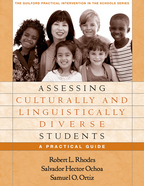Assessing Culturally and Linguistically Diverse Students
A Practical Guide
Robert L. Rhodes, Salvador Hector Ochoa, and Samuel O. Ortiz
This title is part of The Guilford Practical Intervention in the Schools Series, edited by Sandra M. Chafouleas.
“Given the growing numbers of linguistically and culturally diverse students in the schools—and their disproportionate representation in special education—it is critical for school psychologists, school administrators, and educators to become knowledgeable about the impact of culture and language on student achievement and behavior. This important, accessible resource synthesizes a complex body of literature in a manner that is easily understandable, and provides practical suggestions to improve prereferral and special education decision making.”
—Jessica Blom-Hoffman, PhD, Department of Counseling and Applied Educational Psychology, Northeastern University
“This book contains a wealth of information that every school psychologist and child psychologist assessing English language learners should have at hand. The issues are clearly presented and carefully argued. The reader is led to appreciate the need for a complex, integrated approach for untangling the relative influence of cultural and linguistic factors on test performance.”
—Jonathan Sandoval, PhD, School of Education, University of California, Davis
“A 'must read.' This book provides an excellent, integrated approach to assessing culturally and linguistically diverse children. Coverage includes legal and ethical requirements, the use of interpreters, practical information about specific measures, and other relevant topics. It will be of value to a broad range of professionals serving children in schools, community agencies, and hospitals. The book will also serve as a first-class text for psychologists-in-training because of the many resources it contains and the completeness with which each topic is treated.”
—Ena Vazquez-Nuttall, EdD, Combined Doctoral Program in School and Counseling Psychology, Northeastern University
“This book serves as a solid introduction to the challenges facing educators, particularly school psychologists, who work with children from diverse backgrounds. The scenarios presented throughout the book provide practical guidelines and examples of situations that school psychologists are likely to encounter. A particular strength of the book is the consideration of culture and language as dynamic and changing rather than static and absolute. The discussion of issues in bilingual assessment is particularly important and helps to frame the state of the art.”
—Elizabeth D. Peña, PhD, Department of Communication Sciences and Disorders, University of Texas at Austin
Table of Contents
1. English-Language Learners in U.S. Public Schools: A Heterogeneous Population2. Disproportionate Representation of Diverse Students in Special Education: Understanding the Complex Puzzle
3. Legal and Ethical Requirements for the Assessment of Culturally and Linguistically Diverse Students
4. Bilingual Education and Second-Language Acquisition: Implications for Assessment and School-Based Practice
5. Prereferral Considerations for Culturally and Linguistically Diverse Students
6. The Use of Interpreters in the Assessment Process and School-Based Practice
7. The Interview Process: Practical Guidelines
8. Acculturation Factors in Psychoeducational Assessment
9. Language Proficiency Assessment: The Foundations for Psychoeducational Assessment of Second-Language Learners
10. Conceptual Measurement and Methodological Issues in Cognitive Assessment of Culturally and Linguistically Diverse Individuals
11. Cognitive Assessment of Culturally and Linguistically Diverse Individuals: An Integrated Approach
12. Assessment of Academic Achievement: Practical Guidelines
About the Authors
Robert L. Rhodes, PhD, NCSP, is Chair of the Department of Special Education/Communication Disorders at New Mexico State University, as well as a school psychology faculty member. He has experience working in public schools, child and adolescent psychiatric facilities, and an international school setting. Dr. Rhodes has served as President of the New Mexico Association of School Psychologists and state delegate to the National Association of School Psychologists, and is an associate editor of School Psychology Quarterly. His research has focused on intervention strategies for culturally and linguistically diverse students and neuropsychological applications in the schools.Salvador Hector Ochoa, PhD, is Associate Professor of Educational Psychology at Texas A&M University, where he has a joint appointment in school psychology and special education. Dr. Ochoa serves on various editorial boards of school psychology and special education journals, and is an Associate Editor for the American Educational Research Journal: Teaching, Learning and Human Development. He is a recipient of the Teaching Excellence Award from the Texas A&M Center for Teaching Excellence and the Distinguished Achievement for Teaching Award from the Association of Former Students. His research focuses on bilingual assessment, social status, and educational programming issues of Hispanic children.
Samuel O. Ortiz, PhD, is Associate Professor of Psychology at St. John’s University in Queens, New York. Dr. Ortiz has served as a Visiting Professor and Research Fellow at Nagoya University, Japan, and is currently Vice President for Professional Affairs of American Psychological Association (APA) Division 16 (School Psychology). He was appointed to APA’s Committee on Psychological Testing and Assessment and has published widely on such topics as CHC Cross-Battery Assessment, intelligence testing, nondiscriminatory assessment, cultural and linguistic issues in psychology, and learning disabilities.
